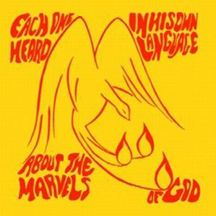EACH ONE HEARD IN HIS OWN LANGUAGE
The music on the second disk also came out on Century Records; it is performed by the St. Pius X Seminary Choir and is called Each One Heard in His Own Language. This music was written and arranged in the year or two before the Search Party album came together, and the work was performed live in the Spring of 1968. This disc also includes the first music recorded by Peter Apps of the Search Party, who sings some passages and also plays lead guitar.
In addition to Each One Heard in His Own Language, I can probably count the number of choral albums in my collection on one hand, though they include some of my all-time favorites. The album Little Drummer Boy by the Harry Simeone Chorale is one; this is where most people heard one of my favorite Christmas songs, “Little Drummer Boy” for the first time, though the song (originally called “Carol of the Drum” and written in 1941 by Katherine Kennicott Davis) had previously been recorded by the Trapp Family Singers. Then there is Christmas Hymns and Carols by the Robert Shaw Chorale, the Christmas album passed down from my parents that we always played while we decorated the Christmas tree. I finally got a second copy of the album for them – a reissue on Pickwick Records called Joy to the World – when I couldn’t bear the numerous skips any longer, though Mom and Dad still usually got out the old one.
But Each One Heard in His Own Language is no standard choral album; there is a psychedelic element and some searing musicianship in this performance as well, particularly in the first song, “Pentecost Sunday, Double Alleluia”. “Who Is This Man” features some jarring, discordant harmonica. Mostly a folk-rock band is playing while the choir sings.
The final song on “Side 1” of Each One Heard in His Own Language is a rocking rendition of the well-known “Get Together”, though this was before the Youngbloods made a hit of the song in 1969. The song dates from the early 1960’s and had been recorded by We Five (it was the follow-up to the 1965 hit song “You Were on My Mind” by this band, who as I recall style themselves as the first band in San Francisco to go electric). Other versions were made by Linda Ronstadt and the Stone Poneys, Jefferson Airplane, Hamilton Camp, Carpenters, the Dave Clark Five, H. P. Lovecraft, and many others.
(September 2014)















